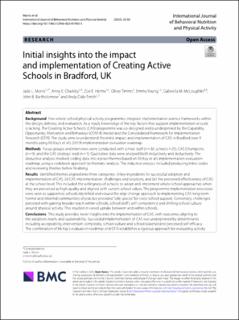| dc.description.abstract | Background
Few whole-school physical activity programmes integrate implementation science frameworks within the design, delivery, and evaluation. As a result, knowledge of the key factors that support implementation at scale is lacking. The Creating Active Schools (CAS) programme was co-designed and is underpinned by the Capability, Opportunity, Motivation and Behaviour (COM-B) model and the Consolidated Framework for Implementation Research (CFIR). The study aims to understand the initial impact and implementation of CAS in Bradford over 9 months using McKay’s et al.’s (2019) implementation evaluation roadmap.
Methods
Focus groups and interviews were conducted with school staff (n = 30, schools = 25), CAS Champions (n = 9), and the CAS strategic lead (n = 1). Qualitative data were analysed both inductively and deductively. The deductive analysis involved coding data into a priori themes based on McKay et al’s implementation evaluation roadmap, using a codebook approach to thematic analysis. The inductive analysis included producing initial codes and reviewing themes before finalising.
Results
Identified themes aligned into three categories: (i) key ingredients for successful adoption and implementation of CAS, (ii) CAS implementation: challenges and solutions, and (iv) the perceived effectiveness of CAS at the school level. This included the willingness of schools to adopt and implement whole-school approaches when they are perceived as high quality and aligned with current school values. The programme implementation processes were seen as supportive; schools identified and valued the step-change approach to implementing CAS long-term. Formal and informal communities of practice provided “safe spaces” for cross-school support. Conversely, challenges persisted with gaining broader reach within schools, school staff’s self-competence and shifting school culture around physical activity. This resulted in varied uptake between and within schools.
Conclusions
This study provides novel insights into the implementation of CAS, with outcomes aligning to the adoption, reach, and sustainability. Successful implementation of CAS was underpinned by determinants including acceptability, intervention complexity, school culture and school stakeholders’ perceived self-efficacy. The combination of McKay’s evaluation roadmap and CFIR establishes a rigorous approach for evaluating activity promotion programmes underpinned by behavioural and implementation science. Resultantly this study offers originality and progression in understanding the implementation and effectiveness of whole-school approaches to physical activity. | en_US |

